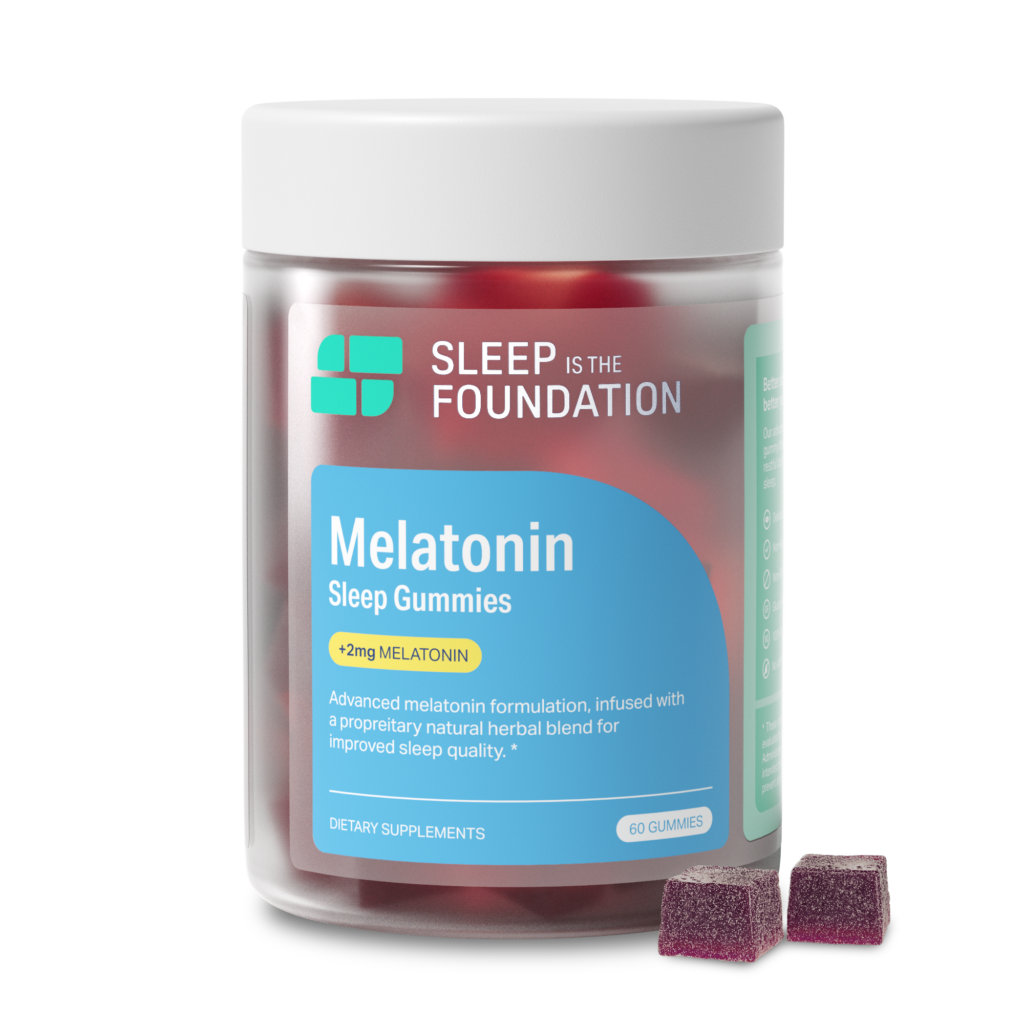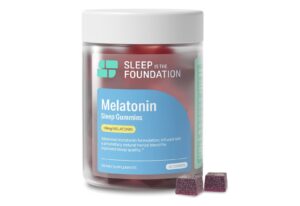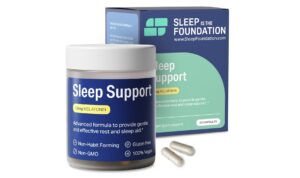When you buy through our links, we may earn a commission. Products or services may be offered by an affiliated entity. Learn more.
Do Melatonin Gummies Work?
People who have difficulty falling asleep may reach for melatonin gummies, since these popular supplements can be effective for certain sleep problems. However, melatonin gummies may not lead to better sleep quality for everyone.
Like other forms of melatonin, melatonin gummies can increase the amount of melatonin in the body to help people fall asleep faster, especially if they experience jet lag or circadian rhythm disturbances.
What Are Melatonin Gummies?
Melatonin gummies are a type of melatonin supplement formed into soft, chewable gummies. People commonly choose to take melatonin supplements to help them fall asleep or to manage sleep problems like jet lag.
Melatonin supplements are manufactured in a lab to mimic the effects of naturally occuring melatonin, a hormone produced by the brain. This hormone helps regulate the body’s circadian rhythm, which controls sleepiness and wakefulness.
Melatonin gummies are just one form of melatonin supplement marketed to help people with sleep troubles. Melatonin supplements are also available as liquids, sprays, and patches, as well as capsules and tablets. Current research does not indicate that melatonin gummies are more or less effective than any other type of melatonin supplement.
Get to the root of your sleep problems
Melatonin can help, but it’s best to find the source of your sleep issues. Answer these questions to better understand your sleep.
How Do Melatonin Gummies Work?
Like other melatonin supplements, melatonin gummies mimic the body’s natural melatonin hormone, which relaxes the mind and body to prepare sleepers for bedtime. In general, supplements are herbs, vitamins, and other substances that people take to improve their health.
Melatonin supplements are not recommended for everyone. Instead, melatonin supplements, including melatonin gummies, may help with specific sleep problems.
Who Should Consider Using Melatonin Gummies?
Evidence suggests that melatonin gummies may help some people with a variety of sleep problems, including delayed sleep-wake phase disorder, jet lag, and a handful of other conditions.
- Delayed sleep-wake phase disorder: People with delayed sleep-wake phase disorder fall asleep late and wake up late. Studies have shown that taking melatonin could help people with this condition fall asleep faster.
- Jet lag: People may experience jet lag when they travel through multiple time zones, disrupting the body’s biological clock. Melatonin gummies can reduce some jet lag symptoms, like daytime fatigue and trouble focusing.
- Childhood conditions: Some conditions, like attention-deficit/hyperactivity disorder, autism, and asthma, can cause sleep problems in children. Research has found that melatonin supplements may help children with these conditions fall asleep faster and get more sleep.
- Insomnia:Insomnia is a condition affecting sleep onset, length, and quality. Evidence suggests that melatonin supplementation may be an effective temporary aid for some people with insomnia, allowing them to fall asleep up to 12 minutes faster.
- Non-24-hour sleep-wake disorder: People with vision problems or blindness can experience disruptions to their circadian rhythms, leading to non-24-hour sleep-wake disorder. Melatonin supplementation may help their sleep-wake cycles get back on a typical 24-hour schedule.
- Shift work: Shift workers must often rely on multiple tools to adjust their circadian rhythms to their work and sleep schedules. Limited research suggests that shift workers who take melatonin may get more sleep.
What Are the Best Melatonin Gummies?
There are many melatonin supplements on the market, including gummy varieties. To find the best product for their needs, consumers may want to learn how brands market melatonin gummies and the types of claims they might make.
Importantly, melatonin gummies are not regulated as drugs by the U.S. Food and Drug Administration (FDA). Unlike drugs, which undergo strict scrutiny from the FDA, melatonin supplements do not have to meet specific standards in terms of strength. They are also not approved by the FDA for any specific use, such as for jet lag disorder or insomnia.
In order to find the best melatonin gummies that are available, consumers should consider a few features.
- Third-party certification: Several organizations test and verify supplements to help consumers make informed purchases. People concerned about purchasing verified supplements can look for products certified by the U.S. Pharmacopeia (USP), the NSF, or ConsumerLab.
- Strength/Dose: Melatonin gummies are available in a variety of strengths, ranging from 1 milligram to 10 milligrams or more. Before starting a melatonin supplement, talk with a doctor about how much melatonin to take and when to take it. Suggested dosing can vary depending on the sleep problem , as well as by age.
- Ingredients: Melatonin gummies can contain dyes, sugar, and other additives. Sometimes this information is clearly indicated on the product label. However, supplements may include ingredients not listed on the product packaging. Melatonin gummies may also contain more or less melatonin than noted on the label.
- Flavors: Melatonin gummies are available in various flavors to suit different tastes, including citrus, berry, and peach. Some brands may offer multiple flavors to choose from.

Better Sleep Starts Here
Try our proprietary melatonin sleep support formula. Its research-backed, clinically-studied ingredients are made to help you wind down and improve sleep quality.
Shop at Sleep DoctorWhat Are Side Effects of Melatonin Gummies?
Melatonin gummies can cause side effects, though they are typically mild . However, research findings show that extended-release supplements and higher doses of melatonin are more likely to result in side effects. There is currently no data about the long-term consequences of using melatonin.
The most common side effects of short-term melatonin use include:
- Daytime sleepiness
- Headache
- Nausea
- Dizziness
Drug interactions can be a concern when taking melatonin gummies. Individuals should check with their doctors before taking melatonin gummies if they are on birth control, consume caffeine, take diabetes medications, or use sedatives. Melatonin gummies can also affect medications and supplements that slow blood clotting, alter immune function, lower blood pressure, or prevent seizures.
How Long Do Melatonin Gummies Take to Work?
The time melatonin takes to work can vary, but research generally supports taking melatonin gummies one to two hours before bedtime for best results. Currently, there is no data on how long it may take melatonin gummies to work or whether they work more quickly or slowly than other forms of melatonin.
When considering whether to take a specific melatonin gummy supplement, read the label and directions carefully, since both extended-release and fast-release formulations are available.
When to Talk to Your Doctor
It is best to check with your doctor before taking melatonin gummies or other melatonin supplements. Your doctor can suggest how much melatonin is safe to take after considering your health history and the medications you currently take.
- Pre-existing medical conditions: If you have a pre-existing medical condition, such as diabetes, high blood pressure, or a seizure disorder, talk with your doctor before using melatonin gummies. Using melatonin may complicate pre-existing conditions.
- Prescription drugs: Melatonin can interfere with a variety of prescription medications. Talk with a doctor or pharmacist before starting melatonin gummies if you take any prescription medications.
- Duration of use: Your doctor can provide guidance on how long to use melatonin gummies based on your sleep needs. In some cases, using melatonin gummies for extended periods of time may delay you from making changes to your sleep hygiene that could improve your sleep.
- Children: Talk to your child’s pediatrician before giving them melatonin, since there is limited research on melatonin use in children. Your child’s doctor can weigh the risks and benefits of using the supplement.
- Pregnancy: There is limited research on melatonin use during pregnancy. If you are pregnant or breastfeeding, talk with a health care provider before using melatonin.
If you have general questions about how to get better sleep, consider keeping a sleep diary and make an appointment to talk with your doctor.

Still have questions? Ask our community!
Join our Sleep Care Community — a trusted hub of sleep health professionals, product specialists, and people just like you. Whether you need expert sleep advice for your insomnia or you’re searching for the perfect mattress, we’ve got you covered. Get personalized guidance from the experts who know sleep best.
Medical Disclaimer: The content on this page should not be taken as medical advice or used as a recommendation for any specific treatment or medication. Always consult your doctor before taking a new medication or changing your current treatment.
References
7 Sources
-
National Center for Complementary and Integrative Health. (2022, July). Melatonin: What you need to know., Retrieved January 19, 2023, from
https://www.nccih.nih.gov/health/melatonin-what-you-need-to-know -
Neubauer, D. N. (2022, December 19). Pharmacotherapy for insomnia in adults. In Benca, R., & Elmore, J. G. (Eds.). UpToDate., Retrieved January 23, 2023, from
https://www.uptodate.com/contents/pharmacotherapy-for-insomnia-in-adults -
Emens, J. S., & Eastman, C. I. (2017). Diagnosis and treatment of non-24-h sleep-wake disorder in the blind. Drugs. 77(6), 637-650.
https://pubmed.ncbi.nlm.nih.gov/28229310/ -
Cheng, P., & Drake, C. L. (2022, November 3). Sleep-wake disturbances in shift workers. In C. A. Goldstein (Ed.). UpToDate., Retrieved January 19, 2023, from
https://www.uptodate.com/contents/sleep-wake-disturbances-in-shift-workers -
Goldstein, C. A. (2022, April 5). Jet lag. In R. Benca (Ed.). UpToDate., Retrieved January 19, 2023, from
https://www.uptodate.com/contents/jet-lag -
Auckley, D. (2022, November 18). Poor sleep and insomnia in hospitalized adults. In Benca, R. (Ed.). UpToDate., Retrieved January 24, 2023, from
https://www.uptodate.com/contents/poor-sleep-and-insomnia-in-hospitalized-adults?search=melatonin -
Auger, R. R. (2022, June 3). Delayed sleep-wake phase disorder. In Goldstein, C. A., & Chervin, R. D. (Eds.). UpToDate., Retrieved January 25, 2023, from
https://www.uptodate.com/contents/delayed-sleep-wake-phase-disorder











